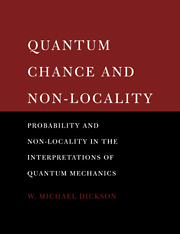 Quantum Chance and Non-locality
Quantum Chance and Non-locality Book contents
- Frontmatter
- Contents
- Preface
- Acknowledgement
- Part one Quantum chance
- Part two Quantum non-locality
- 6 Non-locality I: Non-dynamical models of the EPR–Bohm experiment
- 7 Non-locality II: Dynamical models of the EPR–Bohm experiment
- 8 Non-locality and special relativity
- 9 Probability and non-locality
- Notes
- References
- Index
9 - Probability and non-locality
Published online by Cambridge University Press: 11 September 2009
- Frontmatter
- Contents
- Preface
- Acknowledgement
- Part one Quantum chance
- Part two Quantum non-locality
- 6 Non-locality I: Non-dynamical models of the EPR–Bohm experiment
- 7 Non-locality II: Dynamical models of the EPR–Bohm experiment
- 8 Non-locality and special relativity
- 9 Probability and non-locality
- Notes
- References
- Index
Summary
Review and preview
In chapters 6 and 7, I described some links between locality and the treatment of probabilities in models of the EPR–Bohm experiment. From chapter 6, the main lesson was that, given the strict correlations of quantum mechanics, factorizability of the two-time probabilities is equivalent to two-time determinism. I also noted there that an adequate factorizable theory – one that avoids Bell's theorem – is possible only if λ-independence fails. In chapter 7, I argued that weak symmetry, local determination, and independent evolution together entail deterministic results and weak deterministic transitions.
In chapter 8, I discussed the relationships among the locality conditions of chapter 6 and 7, Lorentz-invariance, and ‘metaphysical’ locality, especially local causality. I have by no means tried to give general answers to the questions raised there. Indeed, part of my thesis is that there is no general answer to be had. Nonetheless, one can use the results of chapters 6 and 7 to investigate the status of various interpretations. Most obviously, they can be used to evaluate whether a given theory is local: if a theory can be shown to violate one or more of the types of determinism entailed by the locality conditions of chapters 6 and 7, then that theory must be non-local in some sense.
- Type
- Chapter
- Information
- Quantum Chance and Non-localityProbability and Non-locality in the Interpretations of Quantum Mechanics, pp. 179 - 216Publisher: Cambridge University PressPrint publication year: 1998
